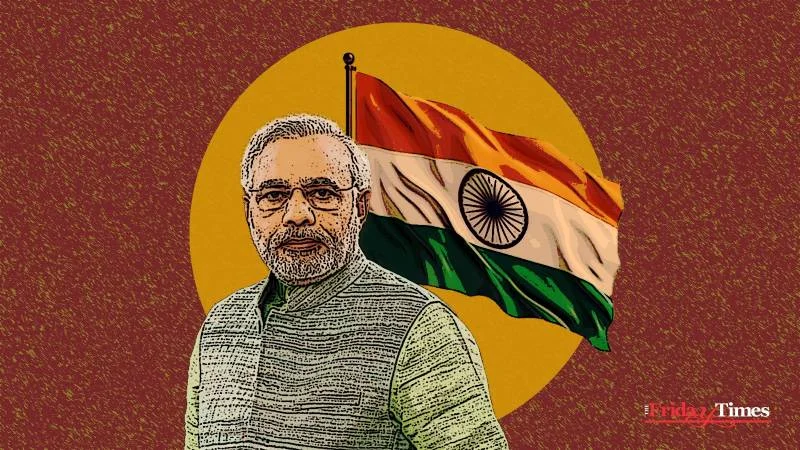Since the Bharatiya Janata Party (BJP) took control of India’s government, religious minorities, particularly Muslims, have been coerced to live as second-class citizens of the so-called largest democracy in the world. The country’s religious minorities are radicalized and in utter despair due to the BJP’s aggressive implementation of its Hindutva ideology. In 2020, the Pew Research Center estimated that there might be 213 million Muslims living in India, making up approximately 15.5% of the country’s population.
Nevertheless, as a religious minority, Muslims continue to endure daily violations of their most fundamental human rights, such as persecution by cow vigilantes for their dietary requirement to consume meat.
India: The Hindutva Rule
According to a study, 97 percent of cow smuggling-related attacks between 2010 and 2017 occurred after Modi ascended to power in 2014, and 24 of the 28 people killed in these attacks were Muslims. While another study reveals that the Indian media reported only four cow-related hate crimes between 2010 and 2014, 71 were reported between 2015 and 2018.
According to the most recent report from the United States Commission on International Religious Freedom (USCIRF), circumstances for religious freedom in India considerably worsened in 2021. During the course of the year, the Indian government increased its promotion and enforcement of policies—including those that advance a Hindu nationalist agenda—that negatively impact Muslims, Christians, Sikhs, Dalits, and other religious minorities. The government continued to institutionalize its ideology of a Hindu state.
Another major violation of fundamental human rights by the extremist BJP government is the suppression of the right to free speech, especially for Indian Muslims. In 2021, the Indian government repressed critical voices, particularly those of religious minorities and those who reported on and advocated for them, through harassment, investigation, detention, and prosecution under laws including the Unlawful Activities Prevention Act (UAPA) and the Sedition Law. The Indian government arrested, filed complaints against, and launched criminal investigations against journalists and human rights advocates who documented religious persecution and violence, including Khurram Parvez, a prominent Muslim human rights advocate who reported abuses in Jammu and Kashmir. Individuals were charged under the UAPA for tweeting about attacks on mosques in Tripura. The United Nations (UN) High Commissioner for Human Rights stated in September that the continued use of the UAPA throughout India is concerning, with Jammu and Kashmir having among the highest number of cases in the country, according to the USCIRF report.
Blatant Islamophobia
In recent years, India’s BJP-led misinformation campaigns against Muslims have spread unprecedented levels of online hatred and Islamophobia.
The report emphasizes that in October, mobs attacked mosques and set Muslim residents’ properties on fire in Tripura, which borders Bangladesh. Numerous incidents of this nature occurred, including the infamous Babri Mosque case and the bulldozing of the homes of Muslims across India who allegedly participated in protests against blasphemous remarks against the Prophet Muhammad (PBUH). According to a 2022 report by The Guardian, violent rhetoric by Hindu extremists regarding Muslim worshiping practices, the use of the hijab by Muslim women, their dietary choices, and the status of mosques has increased significantly over the past two years, despite the fact that the BJP government has maintained an absolute silence on the matter in spite of opposition leaders’ concerns.
In addition to other, more violent forms of discrimination-based persecution, Muslims and other minority groups in India also experience a more subtle but lethal form of persecution in the form of healthcare marginalization. Throughout the pandemic, patients reported that hospitals treated them differently based on their religion and caste, limiting their access to healthcare. In accordance with the USCIRF report, 33 percent of Muslims reported encountering religious discrimination in hospitals during the alarming rise in COVID cases in India, as per a survey by Oxfam India undertaken in 2021.
As living conditions for Muslims and other minority groups deteriorate in BJP-ruled India, the prospects for a renewal of the extremist government’s term in higher offices do not offer an optimistic picture. There is a need for international human rights organizations to increase their presence in the country and exert pressure on the Indian government to ensure the security and welfare of all its citizens on the basis of equality, regardless of their religious beliefs.
The views expressed in this article are the author’s own. They do not necessarily reflect the editorial policy of the South Asia Times






![Ukrainian and Russian flags with soldier silhouettes representing ongoing conflict. [Image via Atlantic Council].](https://southasiatimes.org/wp-content/uploads/2026/02/2022-02-09T000000Z_1319661209_MT1NURPHO000HXCNME_RTRMADP_3_UKRAINE-CONFLICT-STOCK-PICTURES-scaled-e1661353077377.jpg)